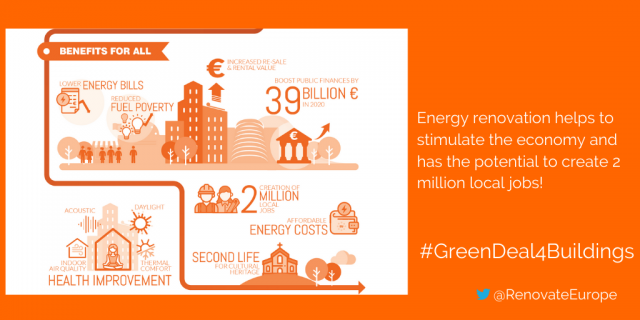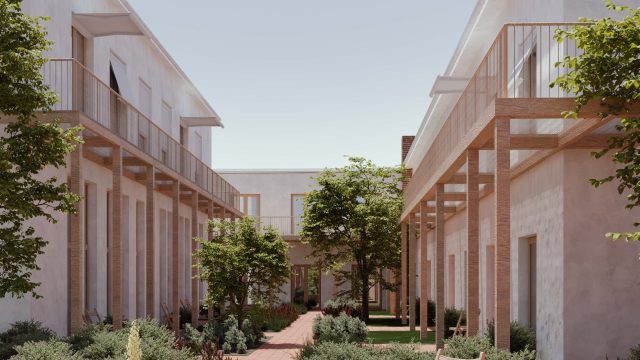“Whatever the EU’s energy, emissions or environmental targets, their success will depend on what we do with our homes,” Renovate Europe is trying to stress in as many forums as possible. But fortunately, it is not just climate change that makes modernising our homes a winning strategy. The Hungarian Energy Efficiency Institute has also joined the initiative to raise awareness of the benefits of energy efficiency in Hungary.
A growing body of research is quantifying the multiple positive impacts of energy efficiency measures that can be enjoyed by governments, market organisations, the economy as a whole and the public. The benefit-cost ratio of renovation of residential buildings is 4 to 1, suggesting that the effects are felt in many areas in addition to the energy benefits:
- reduced health care expenditure,
- lower energy subsidy costs,
- new jobs,
- and increased economic power of the residents who are lifted out of energy poverty by such investments.
Buildings currently account for 40% of the EU’s energy demand and 36% of its carbon emissions, a figure that is not significantly different from the domestic figures. Every year the EU is forced to import 55% of its energy needs, Hungary 60%, at huge cost. As an aside, nine out of ten buildings today will still be in use in 2050.
Renovate Europe welcomes the fact that the issue of buildings has been raised in early discussions on the European Green Deal. Yet policies have not yet succeeded in stimulating the necessary deep energy renovation. This is why Renovate Europe, during the first 100 days of Vice President Frans Timmermans’ mandate, is still loudly proclaiming the need to renovate buildings not only as a means to reduce emissions, but also to exploit many other opportunities – health, competitiveness, economic.
The benefits of better air quality
Across Europe, people spend on average 90% of their time indoors. Temperature, lighting, humidity, draughts and noise are key determinants of physical and mental well-being. More efficient buildings create comfortable temperatures with lower energy use and emissions, as well as better indoor and outdoor air quality.
In 2013, long-term exposure to air pollution caused around 436,000 premature deaths across Europe. In Hungary, around 15,000 premature deaths were attributed to poor air quality in 2015. The main source of pollution is solid fuels burned by households. The direct costs associated with air pollution, including lost working days and higher health care costs, especially for the elderly and children, amount to around €23 billion per year.
Ending energy poverty – health and fiscal benefits
People on lower incomes often live in poor housing conditions that require more energy to achieve the right temperature – whether it is warm in winter or a healthy indoor temperature in summer. Often, the associated costs push them into energy poverty. Recent estimates put the number of EU citizens affected at 41 million in winter and 98 million in summer. Renovating such homes would clearly reduce energy demand, reduce energy bills and lift those affected out of energy poverty.
The public budget would also benefit significantly from reduced health costs. Several studies have shown that young children living in cold, damp homes are twice as likely to suffer from respiratory problems, chest problems or bronchitis. They are also 40% more likely to develop asthma.
Adults living in energy poverty experience high levels of stress related to poor living conditions, housing cost instability, social deprivation and the inability to pay utility bills. For older people, inadequate housing conditions are responsible for a 40% increase in winter deaths in the EU. Around 250,000 more deaths are recorded each winter compared to the summer. Around a third of these, or 80,000 deaths, are linked to poor housing conditions and the inability of residents to keep their homes warm enough.
Energy efficiency boosts productivity and performance
According to a recent report by the Buildings Performance Institute of Europe (BPIE, 2019), deep energy renovations can bring specific benefits to all building types:
Hospitals: Good ventilation systems reduce the possibility of cross-infection, while natural light, thermal comfort and good sound insulation speed up patients’ recovery. Specifically, the research found that an improved indoor environment could reduce the mortality rate in children’s hospitals by 10%, and energy upgrades could shorten hospital stays by 11% overall. This would also lead to a 20% reduction in care costs and staff turnover.
Public and private jobs: Around 36% of the EU workforce – 81 million people – spend 8 hours or more a day in offices. 81% of the workforce works in more than 81% of all workplaces – about 81% of all jobs in Europe. Employee performance can increase by up to 12% after a refurbishment. Overall, healthier workplaces can save a staggering €500 billion a year in the EU.
Schools: Students’ health, attendance, concentration and learning performance are all compromised when school buildings are poorly designed or use outdated systems. BPIE’s modelling estimates that school renovations can improve children’s academic performance by 3-8% – the equivalent of 10 fewer school days per year.
The renovation intensity needed to reduce energy waste by 80% for all building types could potentially create 2 million local jobs. In many cases, this will require skills and capacity building in low-income areas, which will also provide a major boost to the local economy. According to one study, every million Euros spent on residential energy efficiency creates 17 job years. Moreover, the net benefits are also felt in the local economy in the form of higher employment and more disposable income. For example, a family can maintain a comfortable home temperature with lower energy costs while being able to finance other basic expenses.
“Deep energy renovation should be a key priority and support in Hungary as well, as it is the most efficient way to improve the well-being and health of Hungarian residents, and it also brings direct economic benefits while moving towards energy consumption and emission reduction targets” said Zsuzsanna Koritár, Director of the Hungarian Energy Efficiency Institute.


